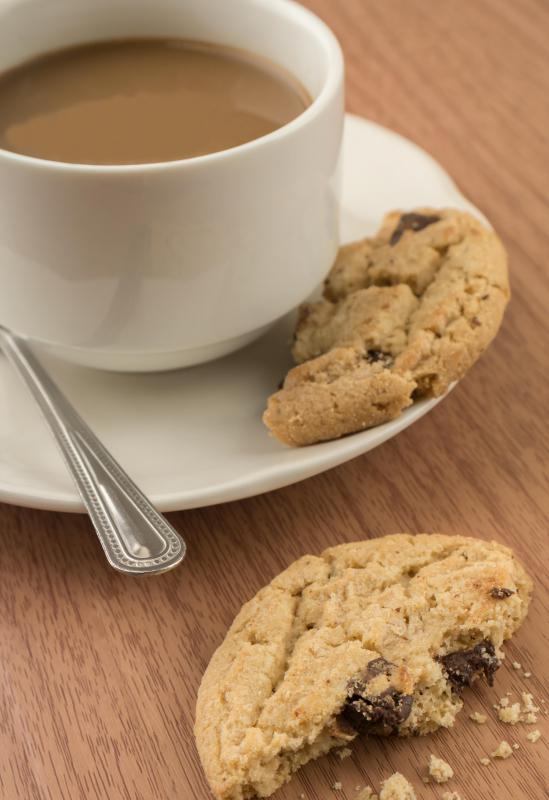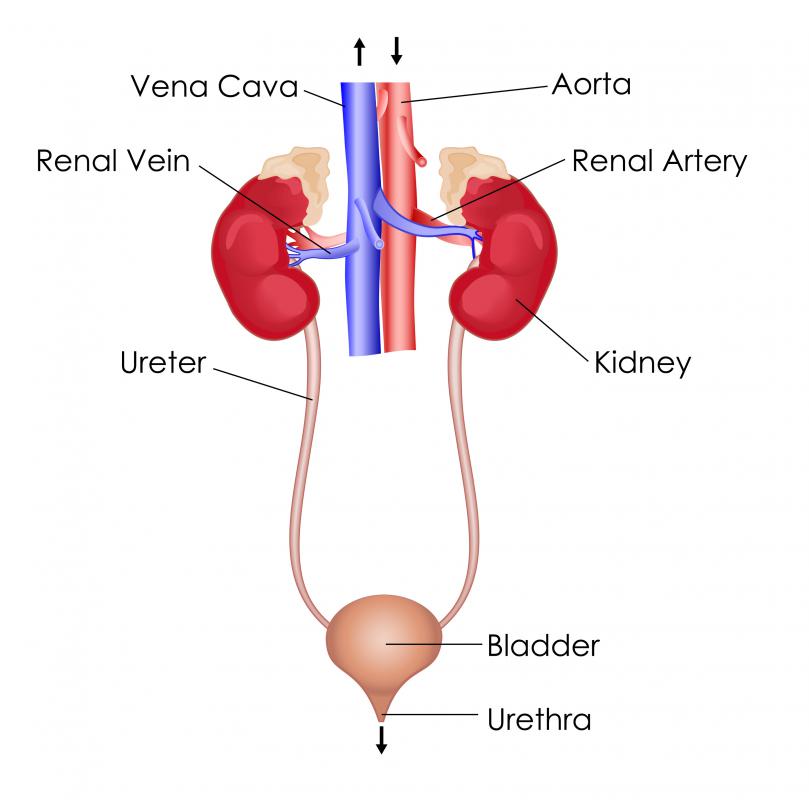At WiseGEEK, we're committed to delivering accurate, trustworthy information. Our expert-authored content is rigorously fact-checked and sourced from credible authorities. Discover how we uphold the highest standards in providing you with reliable knowledge.
What is Trigonitis?
Trigonitis is an inflammation of the vesical trigone region of the urinary bladder. The vesical trigone is a triangular region of the bladder wall, and the three points of the triangle correspond to the locations at which the urethra and ureters connect. Common symptoms of this disease include bladder pain and urinary problems. Its exact cause is still unknown, and there is no standardized treatment plan. There are, however, several medications that can help control the symptoms.
The vesical trigone is the structure that allows the body to detect when the bladder is full. This flat, smooth region is highly sensitive, and as the bladder fills and expands, this area is stretched as well. When it gets big enough, the bladder signals to the brain that it needs to be emptied; the more the vesical trigone expands, the stronger the signals become. Diseases that affect this section of tissue, therefore, tend to cause problems with urination.
Causes

There are multiple theories as to what causes this problem. Trigonitis occurs most often in women of childbearing age, but occasionally men develop it too. For this reason, the cause is thought by some researchers to be related to levels of the hormone estrogen. Some studies suggest there is a correlation between family or childhood history of bladder infections and the occurrence of trigonitis, however, so others believe that repeated infections might lead to chronic inflammation of the vesical trigone region.
Symptoms

Trigonitis causes bladder pain, reduced bladder capacity, and an abnormal increase in the frequency and urge to urinate, particularly at night. For some, the problem can lead to increased pain when sitting in certain positions or discomfort during sex. In addition, some people experience sensitivity to certain foods, and eating them can trigger symptoms.
Diagnosis

The symptoms of this disease are almost identical to those of a more common bladder complaint called interstitial cystitis. This similarity means that trigonitis is often misdiagnosed. The main difference between the two is that the inflamed vesical trigone of a person with trigonitis takes on a cobblestone pattern that is absent in someone with interstitial cystitis.

Confirmation of diagnosis requires a cystoscopic examination, which is performed by a medical professional. During this process, a lens fixed to a long hollow tube is inserted into the bladder via the urethra. With the lens, the doctor is able to examine the examine the inside of the bladder and see if the relevant area is inflamed. Cystoscopy is most often performed under light sedation as an outpatient procedure.
Treatment

There is no standard treatment for trigonitis, and what is effective for one person might not work for another. Pain relief options include muscle relaxants to relieve bladder spasms, anti-inflammatories, and antidepressants, some of which can reduce pain when taken at low doses. Antibiotics are prescribed when infection accompanies the bladder inflammation. Another type of treatment, called a bladder coating or instillation, is sometimes used to provide fast pain relief. A bladder coating is applied to the organ via a catheter and is typically a cocktail of medications used to control pain and inflammation, and to help the bladder heal.
Surgical procedures, such as bladder augmentation or cystectomy, are considered only after all other options have been exhausted. In a bladder augmentation, the bladder is expanded and strengthened with the addition of sections of intestinal tissue. Cystectomy is a last-resort treatment that involves the removal of the bladder, followed by reconstructive surgery.
Self Care
For some people, medication can provide a permanent cure for this disease, but it is much more common for trigonitis to become a chronic condition in which symptoms are controllable, with occasional flare-ups of pain and urinary problems. Exploring self-care options can enhance the relief that medication provides and help a person with the disease feel more in control of her symptoms.
Many people find that eliminating certain foods from the diet can help to reduce the frequency and severity of flare-ups. Trigger foods are not the same for everybody, but can include citrus fruits and certain types of fruit juices, chocolate, grains, caffeine, and carbonated drinks. Wearing non-restrictive clothing and stopping smoking are two other options that can often help relieve symptoms.
AS FEATURED ON:
AS FEATURED ON:















Discussion Comments
I just came home a few hours ago from having an cystoscopy, and I was told I have Trigonitis. I would not have known I had this condition if it weren't for blood showing in my urine. I have no pain, no pressure and no UTI recently. So I am worried maybe it's not Trigonitis after reading the other posts. I am now in my 40's. When I was in my teens to early 20's, I had several UTIs. Should I get another opinion?
I am 31 years old. I've been suffering from trigonitis for 13 years, and I am fed up with it. I am quite depressed. I've seen 15 doctors who specialized in different issues and they always gave me a treatment for infection instead of treating me for this disease. I want to know if a cure exists for this illness. I am from argentina. Thank you
To amend the last post anon201081. The urine test strip was high for white cells, not blood. Sometimes this doesn't even show. My point is that Trimethoprim is worth a try. It works for me.
I had bladder problems as a child (I'm now 58). When I was in my 30s I was fortunate to have a gyn who really listened and thought. He suspected trigonitis and said it often doesn't show in the urine. Treatment was Bactrim, but since I'm allergic to sulfa, he gave me trimethoprim for 21 days. I quickly got better and finished the course.
I had an understanding doc when I moved to Atlanta, who gave me script for use when I needed it. I don't usually need more than week or 10 days. I'm having a rough episode now, the first in a while but when it felt like a nail was in my peehole, I knew what to do. I had a high white blood count, negative nitrite in urine which is typical. The nitrite indicate gram neg in fx (80 percent of UTI which is why they hang their hat on it) and this is usually gram positive. So ask your doc about this.
I've also used the silver nitrite for discomfort and it helped. I'm now on Urelle and Pyridium. I sometimes have retention and drank a coke (all those things mentioned bad). Also very stressed right now so I was prime. Good luck to everyone. --Julie
I also have a lot of problems with my bladder. Since an early age i had about three urinary tract infections a year, and the last one was so bad it lasted three weeks and I changed medication three times and since then I have had an irritable bladder, always tender. It was a lot worse last summer.
Now that i have cut on all caffeine i feel a lot better but still feel it all the time. I can't even press on my lower belly where the bladder is because it's so tender. Even during sexual intercourse it doesn't feel good and makes it worse sometimes.
I am 31 years old and fed up with this, and if i have to live like this for always, well, it isn't worth it. Some people will say i exaggerate but it's to a point that some days i am depressed and don't want to do anything. I don't want to move even though i have lots to do. my husband also can see that i am not 100 percent. this is not a way to live for me or others who are like me.
I hope someday soon they get a cure for this. Like you say i think the same. I wonder if i will ever recover also from this. It's been more than a year now.
In my experience you can get a lot of relief by changing what you eat and drink. Things to cut out completely at the start would be tea (including green tea), coffee, many fruit juices and soda. You can introduce them again slowly to see if they cause a flare for you, as reactions vary between people. Some herb teas and some juices, such as blueberry, are usually safe.
Processed meats, regular breads, many nuts and lots of other foods tend to be triggers. There is however quite a long list of generally safe foods, so it's not too depressing. Managing and restricting your diet is a small price to pay for relief in most sufferer's opinion.
@Windchime - My mother developed this problem when she was around 40 years old. She has gotten a whole lot of good advice and support from an interstitial cystitis network that she found online.
I would advise you to join something like that, as it's a lot easier to talk to people who know what you are feeling, and aren't going to close down at the mention of bladder spasms!
As a family we try our best to educate ourselves about this condition, and offer what comfort we can. The excellent news is that many people do go into remission, and this can last for years.
Hang on in there, and try to take it one day at a time.
As a child I had a lot of bladder problems. It went away for several years before trigonitis symptoms started to appear. I'm pretty much a classic case and having exhausted many other avenues it's become an official diagnosis.
My doctor is supportive but feels I should focus more on acceptance than trying to find a mystical cure. To be honest that's hard to take.
The subject of women and incontinence isn't something I want to deal with when socialising with friends or spending time with family. I am too afraid of not making it to the bathroom in time to spend the night at anyone's house or take a vacation.
Am I fooling myself to think that I will ever recover from this condition?
Post your comments